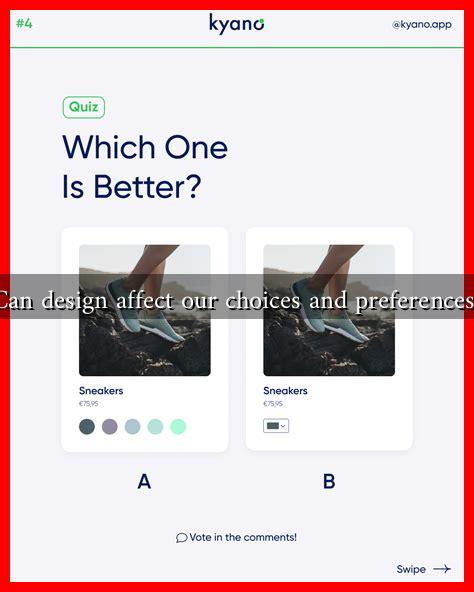-
Table of Contents
Can Design Affect Our Choices and Preferences?
Design is often perceived as a mere aesthetic element, but its influence extends far beyond visual appeal. From the layout of a website to the packaging of a product, design plays a crucial role in shaping our choices and preferences. This article explores how design impacts decision-making, the psychology behind it, and real-world examples that illustrate its significance.
The Psychology of Design
Understanding the psychology behind design is essential to grasp how it affects our choices. Human beings are inherently visual creatures, and our brains process images faster than text. This innate preference for visual stimuli means that design can significantly influence our perceptions and decisions. Here are some psychological principles that highlight this connection:
- Color Psychology: Colors evoke emotions and can influence behavior. For instance, red is often associated with urgency, making it a popular choice for clearance sales.
- Gestalt Principles: These principles explain how we perceive visual elements as a whole rather than in parts. For example, the principle of proximity suggests that items placed close together are perceived as related, which can affect how we interpret information.
- Familiarity and Trust: Well-designed interfaces or products can create a sense of familiarity, leading to increased trust. This is particularly important in e-commerce, where consumers are more likely to purchase from websites that look professional and trustworthy.
Case Studies: Design in Action
Several companies have successfully leveraged design to influence consumer behavior. Here are a few notable examples:
1. Apple: The Power of Minimalism
Apple is renowned for its minimalist design philosophy. The clean lines and simple interfaces of its products create an intuitive user experience. This design approach not only enhances usability but also fosters brand loyalty. According to a study by Forbes, Apple’s design strategy has contributed to its status as one of the most valuable brands in the world.
2. Coca-Cola: The Impact of Packaging
Coca-Cola’s iconic red and white branding is instantly recognizable. The company has invested heavily in packaging design, which plays a crucial role in consumer preference. A study published in the Journal of Business Research found that attractive packaging can significantly enhance product appeal and increase sales.
Design in Digital Spaces
In the digital realm, design is equally important. Websites and applications that prioritize user experience (UX) design tend to perform better. Here are some key elements that can affect user choices:
- Navigation: A well-structured navigation system helps users find what they need quickly, reducing frustration and increasing the likelihood of conversion.
- Responsive Design: With the rise of mobile browsing, responsive design ensures that websites function well on various devices, enhancing user satisfaction.
- Call-to-Action (CTA) Buttons: The design of CTA buttons, including their color, size, and placement, can significantly impact click-through rates. A/B testing often reveals that small design changes can lead to substantial differences in user engagement.
Conclusion: The Indelible Impact of Design
Design is not just about aesthetics; it is a powerful tool that shapes our choices and preferences. By understanding the psychological principles behind design and examining real-world examples, we can appreciate its profound impact on consumer behavior. Whether through color psychology, effective packaging, or user-friendly digital interfaces, design influences our decisions in ways we may not even realize.
As businesses and individuals, recognizing the importance of design can lead to more informed choices, better user experiences, and ultimately, greater success. In a world where first impressions matter, investing in thoughtful design is not just beneficial; it is essential.

